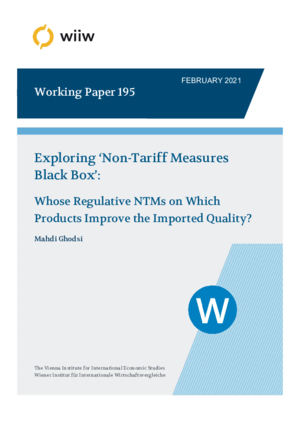Exploring ‘Non-Tariff Measures Black Box’: Whose Regulative NTMs on Which Products Improve the Imported Quality?
wiiw Working Paper No. 195, February 2021
71 pages including 11 Tables and 1 Figure
Regulative non-tariff measures (NTMs), such as technical barriers to trade (TBTs) and sanitary and phytosanitary (SPS) measures, have frequently been imposed to regulate the quality of imported goods when the market fails to address some issues of concern regarding harmful products with low standards. The impact of NTMs on trade values and trade volumes has been extensively modelled and analysed in the literature, while their quality impact has usually been studied using the unit values of imports. In this paper a monopolistic competition framework is presented, in which firms choose both the quality and the price of their exports subject to the compliance costs of NTMs behind the border and a fixed cost of technological change. Using the solutions of this model including NTMs, the quality of products at the six-digit level of the harmonised system (HS) traded globally and bilaterally during the period 1996–2017 is estimated. Using these estimates, the impacts of TBTs and SPS measures on trade values, volume, unit value and quality are estimated. On average and across all global bilateral trade, TBTs restrict imports while improving quality significantly. SPS measures stimulate trade and improve the average imported quality. Then, by estimating the importer-specific impact of NTMs on traded value, quantity, unit value, quality, and quality-adjusted price for each product, the ‘NTM Black Box’ is opened and analysed. This provides evidence of whether the quality of traded goods to an importing country has been upgraded despite the trade restrictiveness of NTMs.
The complete analysed data that are available in the online appendix and visualised on Tableau will provide insights to scholars, policymakers and trade-dispute settlement cases at the World Trade Organisation (WTO).
wiiw
Keywords: non-tariff measures, technical barriers to trade, sanitary and phytosanitary measures, quality of products, global bilateral trade
JEL classification: F13, F14, L15
Countries covered: non specific
Research Areas: International Trade, Competitiveness and FDI, Sectoral studies
